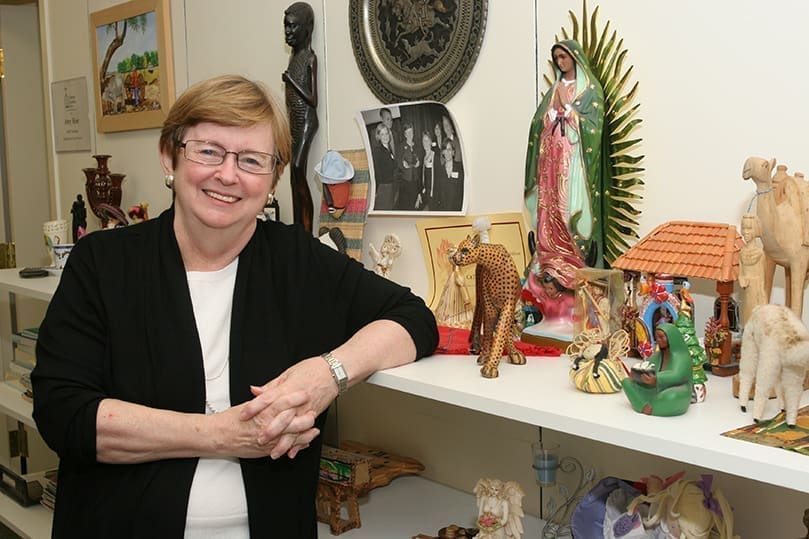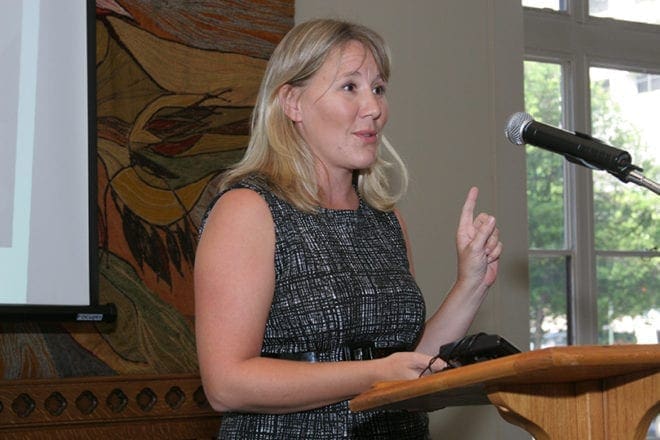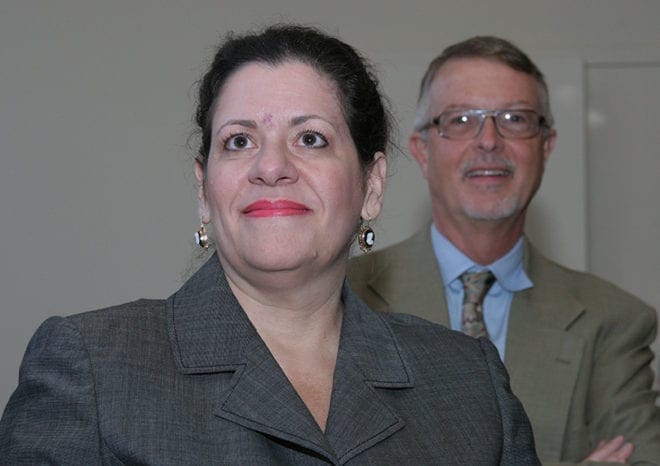 Photo By Michael Alexander
Photo By Michael AlexanderAtlanta
Dedicated Lawyers Her Legacy As Sue Colussy Retires
By GRETCHEN KEISER, Staff Writer | Published September 2, 2010
The job description wouldn’t have enticed many up and coming lawyers.
“They wanted somebody who would work for nothing, and I thought of you,” Sue Colussy’s friend told her.
Retelling the story now, Colussy laughs just as hard as she probably did 25 years ago.
Instead of deterring her, it’s what brought her to Catholic Social Services. They needed a lawyer to work on immigration cases for those who fall through the cracks: poor people, vulnerable people, who couldn’t hire a lawyer but who, with proper legal representation, might have a chance to become legal residents of the United States. This was a legal career that would serve others. The rewards would never be monetary.
“I met Sister Barbara (Harrington) and I was hooked,” Colussy recalled. “She was so charismatic.”
Sister Barbara, a Grey Nun of the Sacred Heart, was a one-person bilingual outreach to the immigrant community through Catholic Social Services. Colussy, an active member of Covenant Presbyterian Church in Atlanta and recent graduate of Georgia State University law school, joined her.
The providential crossroads brings to mind poet Robert Frost’s line: “I took the (road) less traveled by and that has made all the difference.”
Now Colussy is retiring after decades as director of Immigration Legal Services at Catholic Charities Atlanta
Her colleagues in Atlanta and around the country say her legacy includes the solid and enduring establishment of a nonprofit legal voice in Atlanta for the vulnerable and poor. She has mentored and trained so many other lawyers that she is credited with being the backbone of public interest immigration law practice in the metro Atlanta area and elsewhere.
In particular, other lawyers say, her honest, determined practice of this difficult area of law has established credibility for Catholic Charities in the Atlanta Immigration Court and given lawyers starting out under her wing the benefit of that good reputation and the inspiration and push to meet the same standards themselves.
Patrick Walsh, retired AT&T vice president for law in Atlanta, began volunteering in Immigration Services pro bono in 1999 and just wrapped up his last case. The work of Colussy’s shop “is a good business … certainly an important business,” Walsh said.
“Susan has been down there at least 20 years in that Immigration Court. She has established enormous credibility there. A lot of immigrants have benefited from that as well as the kids who follow her in there,” Walsh said.
“She is trying to keep people from getting kicked out of the country. Some are particularly terrifying ones—a matter of life and death.”

Jennifer Bensman will replace Sue Colussy as director of immigration services for Catholic Charities Atlanta. Photo By Michael Alexander
The justices in Atlanta are reputed to have the lowest grant rates in the country, Walsh said. “Susan nevertheless gets it through. She is one tough little cookie in the courtroom. She’ll sink her teeth into the case. She is a skilled trial lawyer in the court.”
“Judges will do something for her they might not do for other lawyers” as a result of her credibility and body of work, he said.
Carolina Antonini started out in social work at Catholic Social Services in around 1991 and shared a workspace with Colussy. They worked on different aspects of people’s problems.
“She inspired me to be a lawyer,” Antonini said. “She encouraged me to apply, and she encouraged me throughout the process. She was pivotal in my decision, and she really changed my life. And she changed the lives of all those I represent.”
A native of Venezuela, Antonini went to Georgia State undergraduate and law school and then worked with Colussy at Immigration Services for several years before she went out on her own. She became the first Hispanic woman judge in Atlanta for a term. Her practice, the Antonini Law Firm, based on the “Sue Colussy model,” is her passion.
“When you work very hard and you don’t have an example in front of you, it is hard,” she acknowledged. “When you work with an example of a great woman like Sue, it helps. She really paved the way not just for me but for many other people.”
Colussy could have had a successful law career elsewhere, Antonini said. Her choice not to, but instead to bring that good legal work to a nonprofit practice, had a ripple effect.
“We are really extensions of Sue. … Sue multiplied her good deed,” her one-time intern said.
“I represent the working poor. I am not going to get a Harvard Business School award … but I do what I love. I learned to admire and respect the working poor when I worked with Sue Colussy, and I decided to make it my life.”
“Being a lawyer to me is not a means to earn money,” she said. “Being a lawyer to me is my deepest identity, as it was for Sue.”
Perhaps as a characteristic she would need often, she was given a great sense of humor—“a wicked, wicked sense of humor,” said Antonini—and a brisk, no-nonsense approach to life.
Colussy chuckles over one memory, when Nelson Mandela came to speak in Atlanta after his imprisonment for opposing apartheid in South Africa ended.
“When Mandela spoke at Georgia Tech, I am sitting up in the nosebleed section. I look down and three of my clients are sitting on the platform,” she said.
Her profession reflects a lifelong involvement with immigrants. She remembers translating for a child on a bus when she was a teenager in upstate New York, using the two years of high school Spanish she knew at the time. Oswego was “an immigrant town,” she said, and “I came from an immigrant family. My mother was a Scottish immigrant.”
Working at Covenant Presbyterian before law school, she was very involved when the church sponsored two families, one from Cambodia, and another from Romania who also lived with Sue, her husband, Alan, and their children for a time. She was on the board of an ecumenical Buckhead coalition of churches that established an international school in the 1970s for children from other countries struggling to start school.
On the job, learning from clients, she developed a Spanish fluency specific to her work. “I can’t order a meal very well, but I can talk about torture and kidnapping and all that kind of stuff,” she said.
In 1989, she was handling 66 cases of people seeking political asylum in the United States because they feared for their lives if they were sent back to their homelands.
In 2010, with a staff of 17 people, seven of them lawyers, Immigration Legal Services has 2,000 to 3,000 immigration cases that range from children needing protection from traffickers, to spouses escaping domestic abuse, to people eligible with proper papers to stay in the United States under various programs, to the complex asylum cases in which lawyers like Colussy and others on her staff struggle, if possible, to rescue desperate people fleeing gruesome violence worldwide.
Funding comes roughly one-third from large grants, such as from the U.S. Department of Justice, one-third from modest fees paid by clients, and one-third from charitable sources such as United Way and the Archdiocese of Atlanta.
Over the years many retired lawyers have worked tirelessly in Immigration Services on a strictly pro bono basis to try and assist on cases that can drag on for years.
Even lawyers on the staff are paid very modestly, Colussy said. “These are people who love what they are doing.”
When she started, most immigrants were coming from Central America and were helped under an amnesty program that was in place for several years. Over the years the crises that drove people out of their homelands and into the United States moved constantly: Ethiopia, Somalia, Congo, Mali, Mauritania, Senegal, South Africa, to name a few.
U.S. Immigration and Naturalization Service, now Immigration and Customs Enforcement (ICE), refers cases to Catholic Charities’ Immigration Services. It is listed as the only agency in Georgia that provides free legal service to people held at the Stewart Detention Facility in Lumpkin.
In an award-winning Atlanta magazine article, writer Paige Williams detailed Colussy’s role in winning asylum for a 17-year-old Burundi girl whose case was given to Colussy by the INS. Williams reported that so many people, including INS agents, gave her name out that it became one word—“suecolussy”—and people came to the office asking for “Sister Lucy.”
Working on these cases is as serious as any law case can be.
“If you really believe your client in an asylum case, it is really like death penalty law,” Colussy said. “If you really believe they will be killed if they go back, you are saving their life.”
At the same time, she isn’t a pushover and she trains her staff to trust their gut instincts and to test the veracity of what clients tell them.
“You can’t take it at face value,” Colussy said. “We have a responsibility as officers of the court that we aren’t taking in fraudulent cases. We all have to have each other’s backs. … We all have to keep up that level of quality and the respect that that engenders (in the court). We have always had a good reputation for being scrupulously honest and doing good work.”

Carolina Antonini, foreground, was urged by Sue Colussy to attend law school and practice law. Antonini formerly worked for Colussy in the immigration services office and currently she is the owner of The Antonini Law Firm. In the background is another friend of Colussy, Terry Bird, retired chief counsel for Immigration Customs and Enforcement (ICE). Photo By Michael Alexander
Maria Odom first met Colussy in 1998, when she joined the Atlanta office of the INS as an assistant chief counsel. In that position, she represented the U.S. government before the immigration judge while Colussy was the advocate “on the other side.”
“We developed an excellent working relationship—even as ‘adversaries,’” Odom said.
Now executive director of the Catholic Legal Immigration Network (CLINIC), Odom said, “In my opinion, Sue’s greatest contribution to the field of immigration law in Atlanta is the professional, stable, and well-funded organization that she leaves behind.”
“Low-income immigrants in Atlanta are blessed to have access to an office where they will be served by outstanding, well-trained professionals, in an environment where their human dignity is preserved, and where their wellbeing is a top priority.”
“Along with her staff, Sue has built and grown this amazing resource and, not only the immigrants are better because of it, but the Immigration Court system benefits from the contributions of her advocates in many cases where individuals would otherwise be left unrepresented.”
Her other “great legacy,” Odom said, is the lawyers she has trained.
“Sue has trained some of the most successful immigration attorneys—several of whom have later come out of her office and entered into private practice. Her attorneys, both current and former, and many mentored by her, have become competent, conscientious, efficient, and compassionate professionals. … Inspiring and training legal professionals who will continue to do this work with great commitment is truly a great contribution,” Odom said.
CLINIC gave her a lifetime achievement award in July, an award that is presented only when merited. She has previously received awards from the Atlanta Bar Association, the State Bar of Georgia, the American Immigration Lawyers Association, the city of Atlanta, and the Emory School of Law Public Interest Committee, a student-led group interested in public interest law who chose her for their inspiration award.
In retirement, Colussy hopes to spend time with her grandchildren and travel with her husband. She says she “would like to go where my clients came from, but in some cases I have to wait for the dust to settle.”
She tears up as she speaks of what she has received from her work.
“A much deeper understanding of what goes on in the world. A much deeper, more personalized understanding of the conflicts and what goes on between tribes. I pay attention when I watch the news. You see more in depth because you can attach it to somebody.”
Her faith “is crucial” to her perspective on her work.
“I have read Catholic social teaching. … The hospitality of the stranger … is totally Old Testament and New Testament. It’s totally biblically mandated for all of the faiths.”
“The interesting thing is we have had lawyers here from many different faith traditions. Everybody feels from their own spiritual, theological background a lot of support for this work because it is supported in their own faith tradition.”
Antonini said her mentor isn’t the diminutive person inside that she appears to be on the outside, calling her “a monument … a thousand feet high in authority.”
“She makes you go to battle. … You had to go out there and seek justice.”